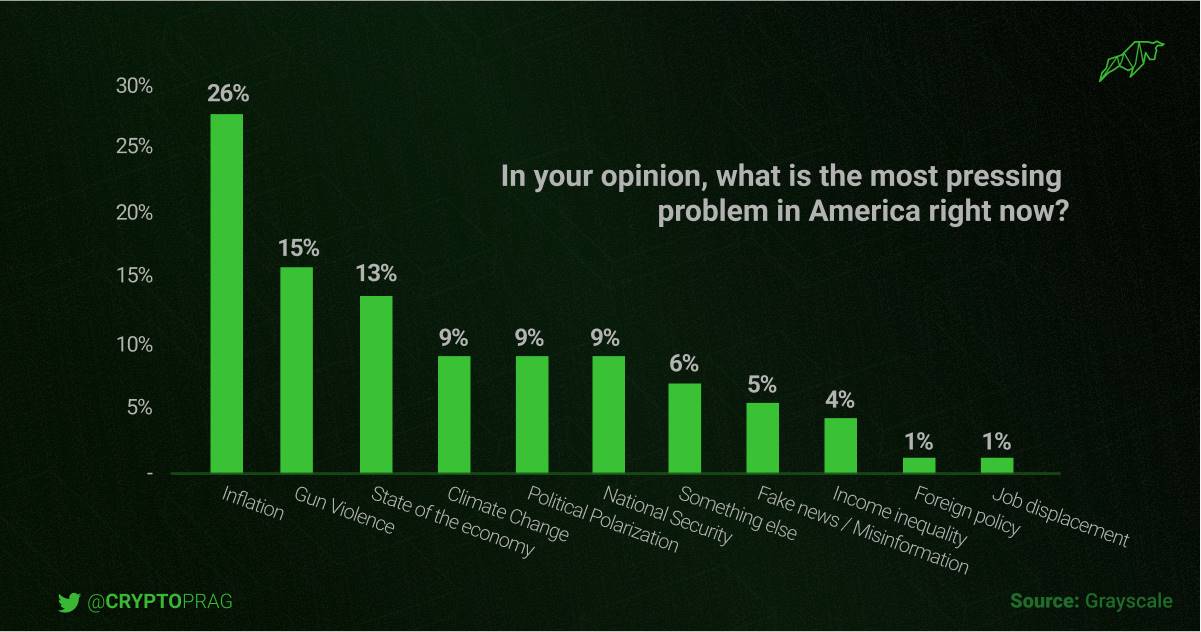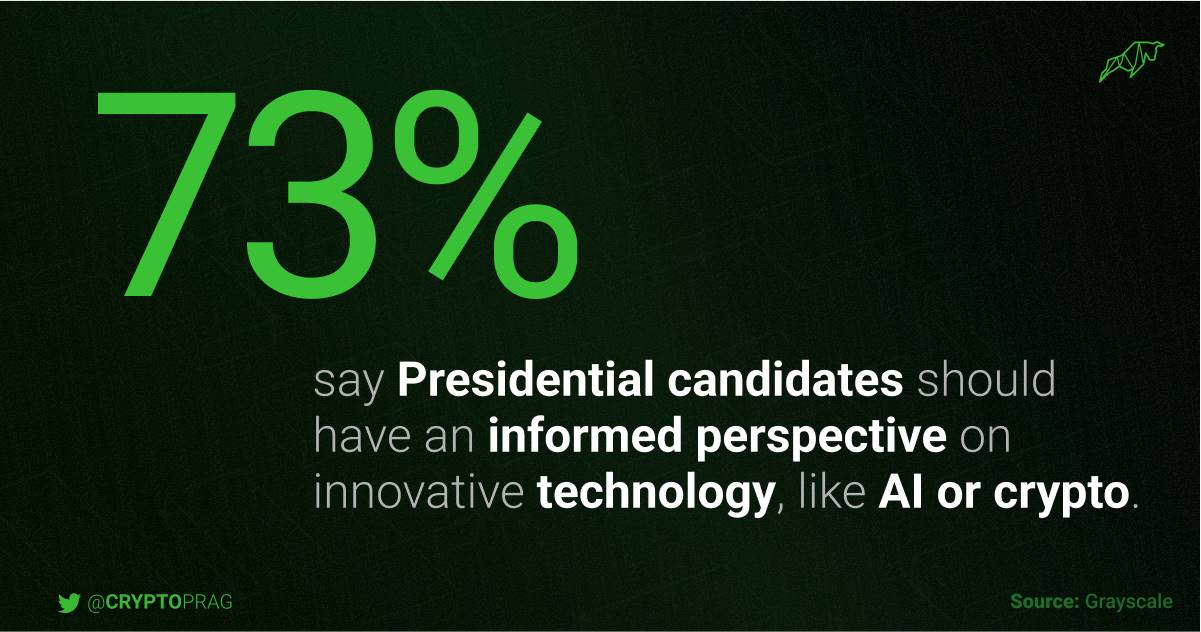Cryptocurrencies are no longer on the fringe of politics.
Author: M6 Labs
Translator: DeepTechFlow
The shift in Trump's stance on cryptocurrencies and Biden's regulatory position may affect voter sentiment.
As the US presidential election approaches, traditional issues such as foreign policy and cultural warfare have become the focus of discussion. However, a new topic seems to have emerged that could play a significant role in the country's elections—Bitcoin (and the entire cryptocurrency market). Let's take a look at the rise of cryptocurrencies in political discussions.
Cryptocurrencies and Politics
Just four years ago, the idea of presidential candidates discussing Bitcoin in their campaigns seemed far-fetched. However, significant changes began to occur during last year's primaries.
Prominent candidates such as Ron DeSantis, Vivek Ramaswamy, and Robert F. Kennedy Jr. attended Bitcoin conferences, appeared on major Bitcoin podcasts, and incorporated plans to focus on Bitcoin into their campaign platforms.
The real turning point came when President Donald Trump noticeably deviated from his previous stance. He had once disparaged Bitcoin as a threat to the US dollar. However, his tone has now become more accepting of Bitcoin. In response to what he described as the Biden administration's "high-pressure action" against the cryptocurrency industry, Trump announced his support for keeping the industry within the US. Additionally, the Trump administration has opened its doors for cryptocurrency campaign donations.
Current Environment
The strict regulatory stance of the Biden administration towards cryptocurrencies has sparked strong backlash from the industry and its supporters. Senator Elizabeth Warren's strong criticism of cryptocurrencies has led several major cryptocurrency companies to leave the US in search of more favorable regulatory environments. This regulatory hostility may alienate a significant portion of American voters, especially as cryptocurrencies like Bitcoin gain mainstream acceptance.
Hayden Adams, the founder and CEO of Uniswap, urged President Biden to reconsider his government's stance on cryptocurrencies and warned that the current policies could drive away voters. In an article on May 12th, Adams criticized the Biden administration for allowing Senator Warren and the US Securities and Exchange Commission to "launch a full-scale war" on cryptocurrencies, implying that Republicans are leveraging this stance to shift towards a more cryptocurrency-friendly position.
After taking office, President Biden signed an executive order on digital assets and nominated Gary Gensler as the chairman of the US Securities and Exchange Commission. Under Gensler's leadership, the SEC has increased its enforcement efforts against cryptocurrency companies, leading to criticism of inconsistent enforcement. With significant cases against companies such as Kraken, Coinbase, Ripple, and Binance, the government's stance has faced backlash from the cryptocurrency community, increasing pressure on Biden to adjust policies before the upcoming election.
Voter Sentiment
A recent poll shows that in key swing states, a considerable number of voters now consider Bitcoin and cryptocurrency policies to be important issues. The actions of political action committees (PACs) supporting Bitcoin and cryptocurrencies further amplify this shift, as they have invested millions of dollars not only in presidential campaigns but also in Senate and House campaigns. The level of investment and political engagement from the cryptocurrency community indicates its growing influence in US politics.
With over 20% of Americans owning Bitcoin or other cryptocurrencies, the potential impact on the electoral landscape cannot be underestimated. President Trump's shift to supporting cryptocurrencies can be seen as a strategic move to capture this growing demographic, especially in a tightly contested election cycle as indicated by polling data.
Given that recent presidential elections have been decided by narrow margins, the cryptocurrency voter base is likely to sway the 2024 election results.
Voter Insights
Harris Poll conducted a national survey for Grayscale titled "2024 Elections: The Role of Cryptocurrencies." Here are some key insights.
Issues of Concern to Voters and Cryptocurrencies

Inflation is the top concern for American voters, prioritizing economic stability and the ability to pay bills over other values such as family, patriotism, and community engagement. This concern aligns with the appeal of Bitcoin, which is often seen as a hedge against currency devaluation due to its hard supply limit. Nearly half of the voters are waiting for clearer policies before investing in cryptocurrencies, indicating a need for regulatory clarity.
Acceptance of Cryptocurrencies by Young People

Compared to traditional stocks, young voters, especially Generation Z and Millennials, show a clear preference for cryptocurrencies, with ownership rates of 31% and 35%, compared to stock ownership rates of 17% and 24%, respectively. The majority of these young people believe that "cryptocurrencies and blockchain technology are the future of finance," with 54% of Generation Z and 58% of Millennials expressing this view. Furthermore, 68% of voters aged 18-34 would be more likely to invest in cryptocurrencies with clearer regulatory guidelines, highlighting the importance of regulatory clarity for wider cryptocurrency adoption.
Integration of Bitcoin into Political Campaigns
The integration of Bitcoin into political campaigns highlights several key trends.

It emphasizes the increasing importance of digital literacy and understanding of technology among presidential candidates. As digital assets become increasingly intertwined with the economy, candidates who can articulate the potential benefits and challenges in a credible manner may gain an advantage.
The political discussions around Bitcoin and cryptocurrencies may encourage an increase in regulatory clarity. As candidates outline their positions, they will need to respond to calls from the industry for clear, consistent, and fair regulation to foster innovation while protecting consumers.
Partisan Divide
While cryptocurrencies have received support from both parties, Republicans appear to favor them more. Politico reported that a crucial vote on "the first-ever full House consideration of a major cryptocurrency policy bill" has essentially been stillborn in the Democratic-controlled House and Senate. Meanwhile, the most vocal supporters of cryptocurrencies currently in office are Republicans, such as Senators Emmer and Cynthia Lummis.
Critics argue that political support for cryptocurrencies often stems from economic interests rather than moral condemnation, but it is undeniable that cryptocurrencies are becoming an increasingly important political issue. For some, it is a defining issue of our time, representing not just an investment opportunity, but a movement, a philosophy, and a way of life.
For many cryptocurrency supporters, this issue is a matter of life and death; Biden's next four years mean more law enforcement scrutiny, more legislative gridlock hindering actual cryptocurrency legislation, and more anti-cryptocurrency rhetoric at the highest political office. The hostility of US legislators and regulators towards cryptocurrencies has been growing, significantly impacting the global industry during Biden's term.
Recently, the reconstruction platform hailed as a major innovation in blockchain, EigenLayer, faced fierce criticism due to a highly restrictive airdrop. Under the current regulatory regime, this is essentially EigenLayer's only move unless it wants to risk being sued by the US Securities and Exchange Commission.
In this environment, it is understandable why individuals like Ryan Selkis, Mike Dudas, and Mark Cuban believe that the cryptocurrency industry must ally with Republicans to secure favorable policies. Critics may argue that former President Donald Trump's recent support for cryptocurrencies is opportunistic, aiming to portray Biden as out of touch. However, in a situation where the US cryptocurrency industry feels under attack by the government, the support of prominent figures like Trump may be a welcome development.
Potential Risks of Politicizing Cryptocurrencies
Trump's embrace of cryptocurrencies carries potential risks. In recent years, the digital asset market has experienced dramatic booms and busts, and major industry participants like Sam Bankman-Fried have been sentenced to prison for illegal activities. This shift also brings risks to Washington's cryptocurrency lobbying groups. Trump may further politicize the regulation of digital assets. The industry has spent years and millions of dollars in campaign donations trying to build support in both parties, which is likely crucial for cryptocurrency companies hoping for legislation.
Conclusion
Fifteen years after Satoshi Nakamoto introduced Bitcoin, it has evolved from a novel digital asset into a significant political issue. As the US approaches its most anticipated presidential election, the role of Bitcoin not only reflects its growing economic significance but also demonstrates its potential to influence policy at the national level.
Whether Bitcoin will become a decisive factor in the 2024 election remains to be seen, but it is certain that the era of cryptocurrencies being on the fringe of politics is gone for good. As we move forward, the dialogue between policymakers, industry leaders, and voters is likely to shape the trajectory of this digital revolution in ways we are just beginning to understand.
免责声明:本文章仅代表作者个人观点,不代表本平台的立场和观点。本文章仅供信息分享,不构成对任何人的任何投资建议。用户与作者之间的任何争议,与本平台无关。如网页中刊载的文章或图片涉及侵权,请提供相关的权利证明和身份证明发送邮件到support@aicoin.com,本平台相关工作人员将会进行核查。




